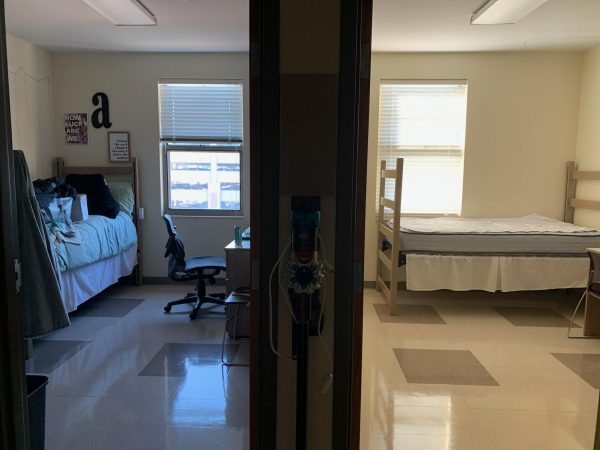Abusive relationships leave long term marks
One in three adolescents in the United States is a victim of physical, emotional, sexual and or verbal abuse from a dating partner. One in ten high school students has been physically hit, slapped, or physically hurt by a boyfriend or girlfriend. Abusive relationships have always been an issue in society, but only 33% of teens who were in a violent relationship ever told anyone about the abuse. Statistics like these are frightening and help raise awareness to the growing numbers of abusive relationships. But it does not make abusive relationships less unhealthy. Samantha Kaysinger, Rolla High School Sociology teacher and Randi Turntine, counselor at Rolla Russell House, are two women who have personal stories and advice to give to others to help prevent abusive relationships.
“As any individual, the long term effects of an abusive or unhealthy relationship, are very profound. I would say the biggest impact is the emotional impact. And it is to varying degrees, depending on the person and circumstances of course. But it tends to be a situation where those who have experienced that, the emotion trigger and scars are the most long lasting. There will be things later on in their life that will occur, if they have a very strong self awareness, they can relate back to that abusive relationship. Sometimes we do things that we can’t necessarily explain further self reflection. Its stemming from that experience,” Kaysinger said.
Girls and young women between the ages of 18-24 experience the highest rate of intimate partner violence. The Rolla Russell House provides shelter, counseling, and support groups for any woman varying in ages.
“Statically, the age you are more likely to be abused is 18-24. At the Russell House we do tend to see the lower age range. But we have had younger, like our youngest person was 17 and our oldest person was 82. The age range really varies, its not like we have one specific demographic that we serve. 18-30 is our biggest but that doesn’t mean that your categorically in that area,” Turntine said.
Nearly half of all women and men in the United States have experienced psychological aggression by an intimate partner in their lifetime, meaning the stereotype behind women only being affected by abusive relationships is false, men are just as affected.
“Absolutely both, on so many levels. I think that is a problem in our society is that it is only a woman issue. It is not. Many women are engaging, and they are doing the same thing to the men in their lives. You also look if guys are seeing this. If this is what they have grown up with they are more likely to engage in those behaviors. What we find in an abusive [relationship], is it is not a one time event; it is a cycle. I think it is a societal problem, not just a girl or guy problem,” Kaysinger said.
The Russell House may only house women in their facility, but they still provide services to men in surrounding communities.
“We see women in our facility. Occasionally we have men come in for counseling, we are able to do that. But we don’t house men at the Russell House just because we can’t have a person who has been sexually assaulted in one room and a man next to their room. There are shelters that do help men, so we can refer them to one. Now we are not going to say ‘sorry it’s the middle of the night we can’t help you’, we can provide protection elsewhere. We have the resources to help women and men we just don’t house them here. But for counseling, we do help them with that. Since I have been at the Russell House [since 2014] we have seen three men for counseling and other services,” Turntine said.
Someone staying with their abuser is not unheard of. Reasoning behind it all is different for every person, but they still need help and support.
“If they have children then that is always a huge reason. No one wants to displace their kids, just because they are abusive to the mother doesn’t mean they are abusive to the kids. Financially, some people can’t make it on their own and they depend on that. Sometimes men will even be jealous of a woman who is working because he thinks she is working around other men, and they may not let the woman work to where she can’t afford to leave and she feels like she is stuck in that situation. Everybody has their highs and lows, they can be still attached and love that person. Then they fall into that chain where they say, ‘if I do this then he will change’ or maybe ‘if he makes better money he won’t be so stressed out’. They never seem to get better. So everybody has a different reason for staying, they just have to have the support to leave,” Turntine said.
The question always asked is how to handle the situation if you are in an abusive relationship. Places like the Russell house provide protection and guidance. Taking the first step and reaching out for help is always the hardest.
“It’s probably the hardest for others around you. Even though you see it and the people around you see it, it is very unlikely that any significant change occurs until you are ready to make that change. I know of someone who bought a couch, and realized that they didn’t want to put that couch in that house with that person. So therefore they were ready to be done. And as silly as that sounds, and for some it’s a more tragic situation, that person just has to be done, and feel that they have the resources or support to be able to escape that situation,” Kaysinger said.
Watching and knowing a close friend or family member who is in an abusive relationship, is very difficult. When that person does not want help, you have to stand by their decision until they are ready to leave.
“If you know someone in abusive relationship, often those ties with you will break at some point. That is a manipulative tactic. But you just have to maintain your support for that person. In a sense it is easy to condemn the person doing this, if you will. But it is important to say, ‘I am here for you and whatever you need. And whenever you are ready I will help you’. Even when it is difficult to stand by and see this happening. If it is a younger individual, then I always suggest to tell an adult in some way, so that they can offer that support. Sometimes people are just looking for somebody to listen. They feel so isolated at this point they don’t know where to turn, its a good idea to engage adults and those who care and always pledge your support to them,” Kaysinger said.







